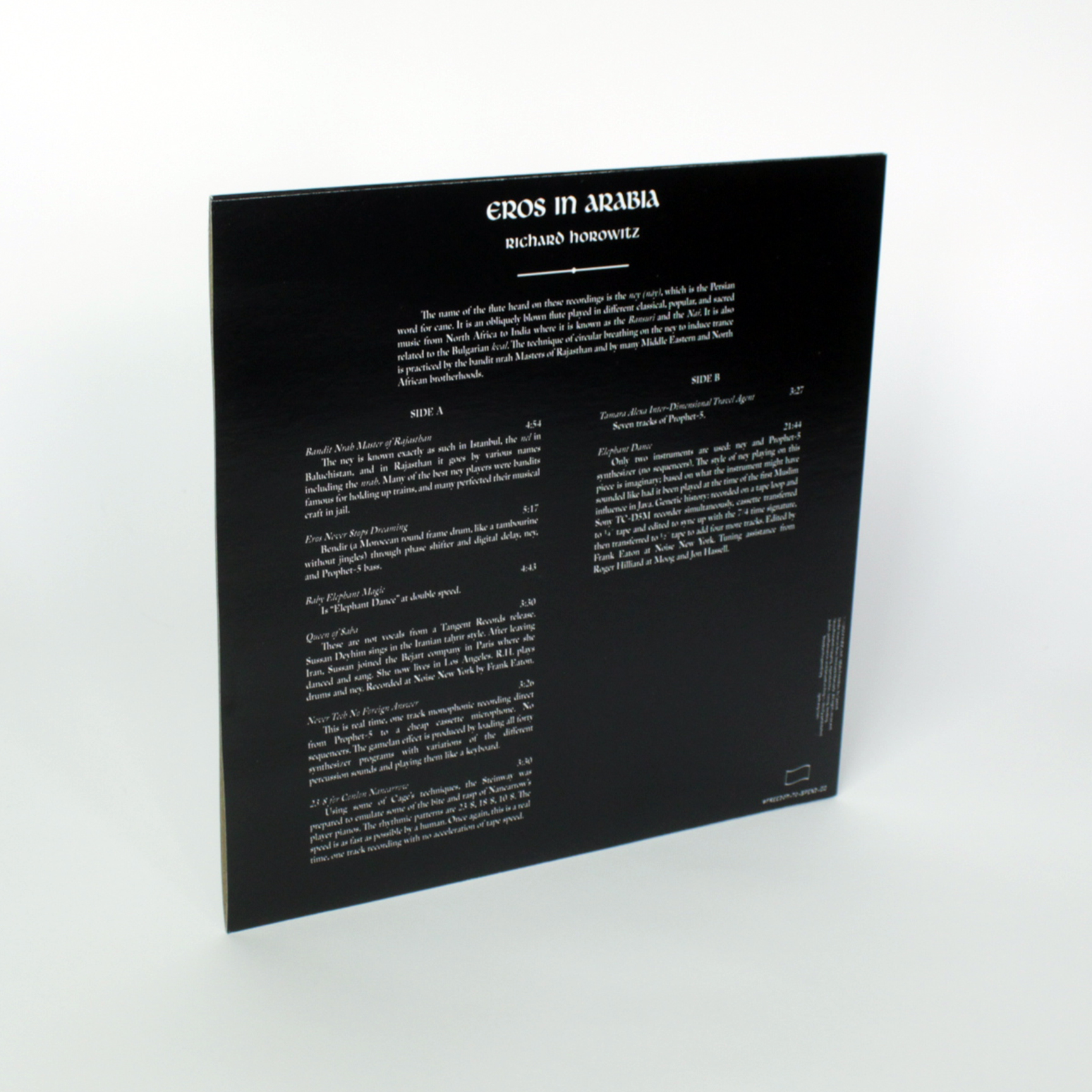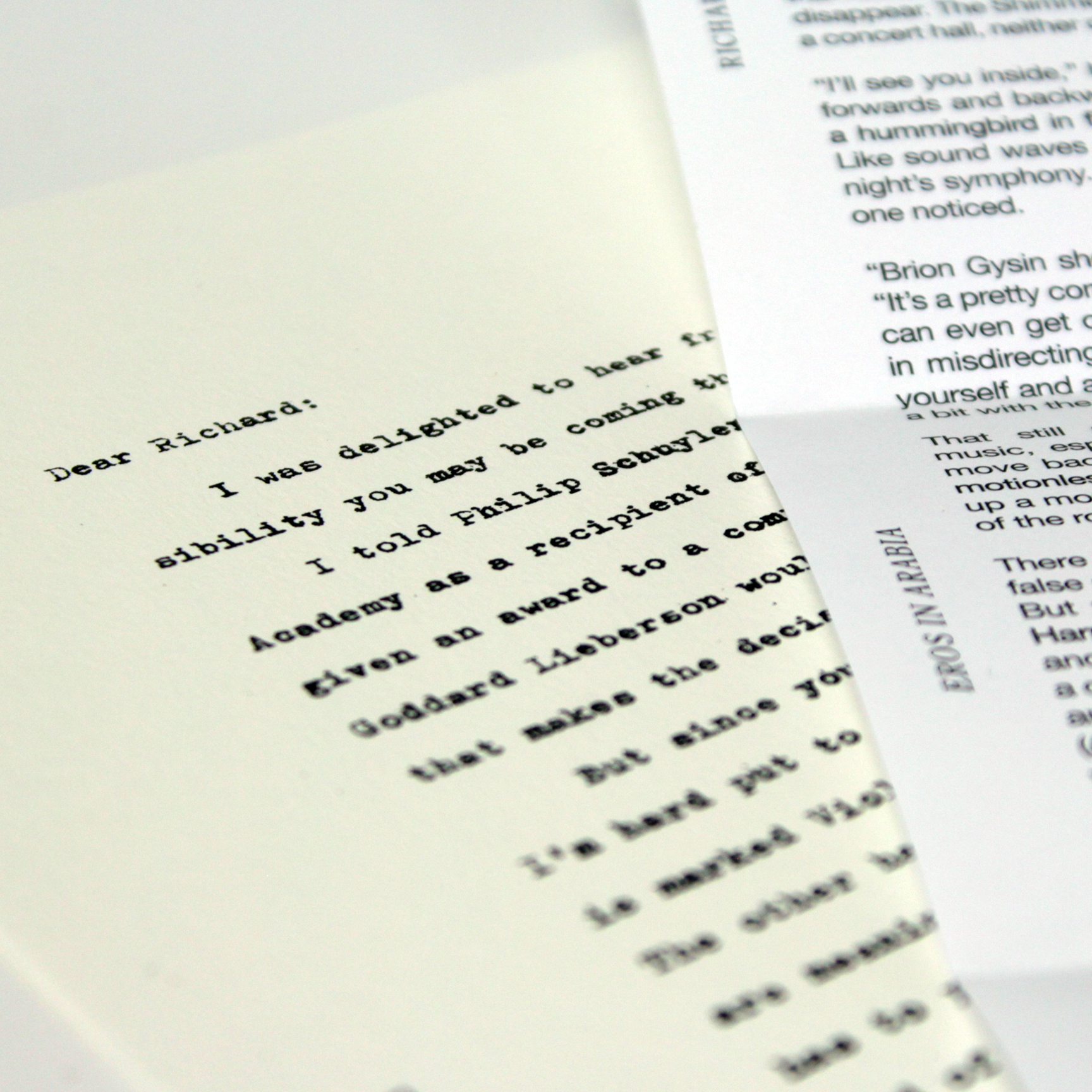RICHARD HOROWITZ
EROS IN ARABIA
FTS004
Vinyl LP








RICHARD HOROWITZ
EROS IN ARABIA
FTS004
Vinyl LP
With liner notes by Brian Cullman. LP editions purchased directly from Freedom To Spend include exclusive Risograph printed insert with original Eros in Arabia cover collage and a reproduction of a letter from Paul Bowles and Richard Horowitz’s long documented correspondence.
This vibration is cast into new dimensions. Liberating Eros, it circles the globe, backwards and forwards, flowing to and through us. It is said the artist has a gift— suited for the erotic life of property.
On Eros in Arabia, Richard Horowitz channels this vibration and bends bandit sounds by pairing the ancient ney cane flute with the Prophet-5 synthesizer. Interspersed with other instruments and ideas, like echo delayed Moroccan drumming and self-made magic, these elements deal in duality like the ever-shifting characteristics of the composer: the Hollywood Horowitz who scores films like The Sheltering Sky and Any Given Sunday, and the Morocco Horowitz who founded the Gnaoua Festival in Mogador, attended by 500,000 people every year.
Working in natural succession from end to beginning, “Elephant Dance” demonstrates the central synth and ney node to explore energetic sound patterns Horowitz imagined to be played in the 16th century on the island of Java, around the time Sufi’s may have arrived in Indonesia. Delicately trampling the twenty minute mark, the piece offers an immersive climate of microtones that might, with the primordial matter of love, alter DNA. “Baby Elephant Magic” is “Elephant Dance” but sped up— producing digital baubles that sound less like an Indonesian forest, more like an urban hive of mechanical insect interaction.
The piano on “23/8 for Conlon Nancarrow,” with John Cage technique at play, is played “as fast as possible by a human.” The sounds are driven to derail from the space time continuum. On “Never Tech No Foreign Answer,” a cheap cassette recorder microphone captures the Prophet-5 left to the devices of its master’s inner clock, taking on a frenzied sound form that vibrates in place before bouncing off the tape case walls. Chaos is concentric.
“Queen of Saba” incorporates the vocals of long-time collaborator, Sussan Deyhim. Described as one of Iran’s most potent voices in exile, Deyhim’s work is in both the tradition of Sufis and the late feminist poet, Forough Farrokhzad. Recently Deyhim and Horowitz worked together on a multi-media performance based upon Forrokhzad’s Iranian New Wave film, The House Is Black. Here Deyhim performs a taḥrīr where vocals go low to high without any semantically meaningful words. Horowitz’s associations with great cultural icons of the Middle East, like these women, soften (in)appropriations.
Less aggressive than its predecessors, “Eros Never Stops Dreaming” introduces the bendir frame drum, the feathery wind of the ney floating above its bowing rhythm with effortless mathematics. “Bandit Nrah Master of Rajasthan” begins where the album ends, an ode to Shakuhachi flute players known to indulge in both trance-inducing circular breathing and espionage.
Horowitz is linked with the worldly sound seeking circles of minimalist and avant-garde New York City musicians, especially Lou Harrison and La Monte Young, with whom Horowitz shared Shandar as a record label momentarily. He recorded and toured with Jon Hassell and collaborated with David Byrne and Brian Eno, Jean-Philippe Rykie, and Bill Laswell. Along his travels he befriended Brion Gysin and Paul Bowles, the latter whom mentored Horowitz over decades of correspondence, some of which documents the making of Eros and comes quite literally with this edition.
A record of physical and intellectual love for Arabia, FTS extends this flowing forward and backward - a shimmer that reverses the backward spelling of Ztiworoh. Eros is presented in the ever present. To borrow from a song title, Horowitz remains gainfully employed as an “inter-dimensional travel agent.”